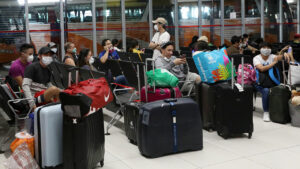Our capacity to defend our countrymen

All throughout the continuing saga of US Women’s National Basketball Association (WNBA) player Brittney Griner, we had wondered whether it is the obligation of governments like the Philippines to defend every citizen who is accused of a crime in a foreign land. The US government provided counsel to Griner and other forms of assistance. Last Thursday, however, a Russian court sentenced Griner to nine and a half years in prison, almost the maximum number, for the crime of international drug smuggling.
Griner’s ordeal started with her arrest for carrying less than one gram of cannabis or hashish oil in vape cartridges. Griner claimed during her trial she had mistakenly put the cartridges in her luggage in her rush to catch a flight to Moscow to play in Russia’s women’s professional basketball league. Over the last five years, she had been going to Moscow during the WNBA off-season, as most WNBA players do. The Russian league reportedly paid five times more than the WNBA. Griner, in effect, was an American overseas worker or an expat. That arrest at the airport on Feb. 17 was totally a surprise to her as during all those earlier trips to Moscow, she never encountered any problem.
It was Griner’s misfortune, however, that relations between Washington and Moscow were heating up. On Feb. 24, the Russians invaded Ukraine. Other sources stated that being black and being in a same-sex marriage further invited the attention of the Russians. The detention of Griner should therefore be viewed in the light of tensions between the US and Russia. Griner was charged with international drug smuggling, a major offense in Russia. To further strain relations between the two nations, the US claimed there were unjustified delays in Griner’s trial and that she was “wrongfully detained.”
As the Russia-Ukraine war escalated, Griner vanished from sight even if she was detained in a Russian jail. Fellow athletes, civil society groups, and the US government itself denounced the athlete’s disappearance. Eventually, Russian authorities produced Griner.
At this point, it is clear that Griner is what is called a “diplomatic hostage” and is now in the center of a prisoner swap together with another American detained in Moscow, ex-Marine Paul Whelan. Whelan is one of 64 Americans detained in prisons in Iran, China, Venezuela, and other countries that could use these detainees as bargaining chips in any dispute.
Apparently, the Russians have decided to do just that: use Griner as leverage to extract concessions from the Americans such as the release of Russian arms dealer, Viktor Bout. Bout, a military interpreter, is spending time in a US jail for smuggling weapons from Eastern Europe to Africa and the Middle East. A spokesman of the Biden administration has said that they had made Russia a substantial offer to bring both Griner and Whelan home. If they are indeed brought home, the negotiation would be considered a success.
At this time when plain citizens, tourists, businessmen, journalists, and researchers can be picked off the street and used as some kind of pawn in a diplomatic crisis, it is understandable that athletes like Griner would hesitate to travel to countries that have a diplomatic axe to grind with other nations. An added dimension here is that Russia seems to be in some kind of mood to get back at those responsible for the ban on their athletes in the Olympics and other world competitions because of state-sponsored doping.
Let us go back to our original question of whether governments like the Philippines have an obligation to defend or provide for the defense of their citizens who are charged with criminal offenses in countries hosting these citizens. The question becomes relevant because of the big number of Filipinos working or living overseas. Secretary of Labor and Employment Bienvenido Laguesma says that there are between 10 million and 12 million Filipinos working abroad, depending on who is making the estimate.
The 71-year-old Laguesma, now on his second stint as Secretary of Labor after having occupied the same position in 1998 during the administration of President Joseph Estrada, says that it is indeed the legal and moral obligation of the government to do its best to defend a Filipino who is in some kind of legal trouble overseas. Laguesma, however, adds that we must take into account our resources and respect the sovereignty of the host country, as they should respect ours.
Laguesma says that, then as now, Overseas Filipino Workers (OFWs) are made to undergo pre-departure orientation seminars (PDOS). These seminars are supposed to guide departing workers on essentially how to behave in their country of work. It’s like briefing workers on codes of conduct, the “do’s and don’t’s,” if you will, and can be specific to the country where one is assigned. Despite these seminars, however, a number of OFWs manage to get into some kind of trouble. Some departing workers don’t attend such seminars and even submit forged certificates of attendance. And, as admitted even by some labor officials, some of our countrymen do instigate the problem out of need, frustration, and loneliness. When there are signs that our fellow citizens may be at fault, the government is very careful in extending legal assistance. Government representatives, however, do exercise moral responsibility and assist the worker in whatever way they can.
The question that is asked now is, if it is the obligation of government to provide legal assistance to an embattled fellow Filipino, are the agencies tasked to provide such legal assistance provided with the budget, the wherewithal to hire the counsel who can adequately defend the accused Filipino? Laguesma says that the Department of Foreign Affairs (DFA) and the newly created Department of Migrant Workers will have the funds for such purposes.
The example of the US government going all out in defense of Griner who is “wrongfully detained” is probably inapplicable in the case of the Philippines. To begin with, Griner and Whelan have become pawns in US-Russia relations. However, with millions of Filipinos working overseas, we are most vulnerable to all sorts of crisis situations involving our nationals stationed overseas. And the potential for each crisis becoming an opportunity to blame the government for its inability to come to the aid of the lowly and lonely overseas worker is great.
The most celebrated case of a Filipino being executed abroad was Flor Contemplacion who was accused of killing a fellow Filipino maid, Delia Maga, and the three-year-old son of Maga’s employer. All attempts to save Contemplacion from the death penalty were unsuccessful. The Singaporean government executed her at Changi prison. Relations between the Philippines and Singapore were strained for some time.
Despite all the efforts of the government to save Contemplacion, organized labor still blamed the government for her execution. It was clear that overall frustration with the plight of OFWs had reached a boiling point and had become a political issue in the Philippines with the May 1995 elections just around the corner.
It was expected, that the execution of an overseas worker — regarded as a “Bayani ng Bayan” (Hero of the Country) — will always be a political and emotional issue among many Filipino families whose well-being is dependent on those offshore dollars that their loved ones send to the country.
Philip Ella Juico’s areas of interest include the protection and promotion of democracy, free markets, sustainable development, social responsibility and sports as a tool for social development. He obtained his doctorate in business at De La Salle University. Dr. Juico served as secretary of Agrarian Reform during the Corazon C. Aquino administration.




